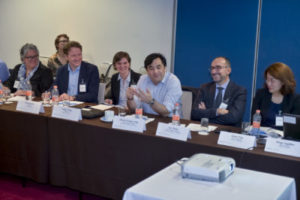The Implementation Challenge: Sustainability Solutions for Infrastructure and Extractives in Emerging Markets
Sustainable Finance

EMSD Workshop in Mexico City on 19 and 20 April
Investments in infrastructure and the extractive industries can be a powerful engine for sustainable growth and development. When poorly planned and executed, they may create substantial risks, including for the environment, the well-being of local communities and public finances.
The two-day workshop, hosted jointly by the Emerging Market Sustainability Dialogues (EMSD) and the International Finance Corporation (IFC), brought together stakeholders from the private and financial sectors, including project developers, asset managers and banks, representatives from civil society, think tanks, government and international organisations, and providers of selected sustainability tools to work on improved implementation of existing sustainability efforts in both sectors.
Participants tackled the issue of improved implementation from three angles: stakeholder engagement, sustainability rating and asset valuation, and the role of the financial sector in fostering sustainability. With a clear focus on how sustainability philosophy and goals can be translated into tangible results and concrete action, the workshop was organised around introductory panels and breakout sessions. The goal of the breakout sessions was to work on concrete ideas for implementation pilots. Key takeaways include:
- Stakeholder engagement: This is not just about acquiring a “social license to operate” and reducing risks; it is about genuinely engaging those who have a stake in play and creating mutual benefits, reflecting economic, environmental, social and human rights considerations and taking the mid and long-term perspective into account; adequate capacity (building) is a key success factor.
- Sustainability rating and asset valuation: While there is an abundance of tools and standards addressing sustainability, project developers and financiers are often still unsure how to incorporate sustainability considerations into their decisions and operations; a principal challenge consists in knowing and assessing different tools as to where they come into play along the project cycle, how they may interact and complement each other, as well as their alignment on core principles, in particular on sustainability rating.
- Financial sector: This is not just about financing high-quality projects, but also about funding the whole project cycle, including in particular in the planning phase, for which funds are often lacking; it is not just about mitigating ESG risks, but also about using financial ingenuity for innovative solutions, such as blended finance instruments informed by genuine stakeholder buy-in; monetising sustainability costs and benefits is required to demonstrate the business case for the sustainability agenda.
In addition to engaging in fruitful dialogue and exchange, participants agreed on road maps for joint cooperation/pilot projects. Ideas that sparked particular interest include:
- Implementation pilots for selected sustainability tools
- Mainstreaming sustainability tools and standards within industry associations
- New approaches and analysis about complementarity of sustainability tools and the core principles they are built on
This workshop was set up as an outreach into Latin America but has a clear global ambition – carrying results into other emerging markets, in particular through participants and partners in China and South Africa.
The workshop agenda and handbook are available here.
For more information, please contact antje.uhlig@giz.de and john.hauert@giz.de


